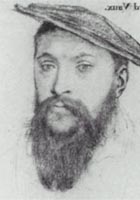Thomas Vaux
Thomas Vaux Poems
When all is done and said,
In the end thus shall you find,
He most of all doth bathe in bliss
That hath a quiet mind:
...
. I loathe that I did love,
In youth that I thought sweet;
As time requires for my behove,
Me thinks they are not meet.
...
To counsel my estate, abandoned to the spoil
Of forged friends, whose grossest fraud is set with finest foil;
To verify true dealing wights, whose trust no treason dreads,
And all too dear th'acquaintance be, of such most harmful heads;
...
Thomas Vaux Biography
VAUX OF HARROWDEN, THOMAS VAUX, 2ND BARON (1510-1556), English poet, eldest son of Nicholas Vaux, 1st Baron Vaux, was born in 1510. In 1527 he accompanied Cardinal Wolsey on bis embassy to France; he attended Henry VIII. to Calais and Boulogne in 1532; in 1531 he took his seat in the House of Lords, and was made Knight of the Bath at the coronation of Anne Boleyn. He was captain of the Isle of Jersey until 1536. He married Elizabeth Cheney, and died in October 1556. Sketches of Vaux and his wife by Holbein are at Windsor, and a finished portrait of Lady Vaux is at Hampton Court. Two of his poems were included in the Songes and Sonettes of Surrey (Tottel's Miscellany, 1557). They are " The assault of Cupid upon the fort where the lover's hart lay wounded, and how he was taken," and the " Dittye . . . representinge the Image of Deathe," which the gravedigger in Shakespeare's Hamlet misquotes. Thirteen pieces in the Paradise of Dainty Devices (1576) are signed by him. These are reprinted in Dr A. B. Grosart's Miscellanies of the Fuller Worthies Library (vol. iv., 1872).)
The Best Poem Of Thomas Vaux
A Quiet Mind
When all is done and said,
In the end thus shall you find,
He most of all doth bathe in bliss
That hath a quiet mind:
And, clear from worldly cares,
To deem can be content,
The sweetest time in all his life
In thinking to be spent.
The body subject is
To fickle Fortune's power,
And to a million of mishaps
Is casual every hour;
And death in time doth change
It to a clod of clay;
Whereas the mind, which is divine,
Runs never to decay.
Companion none is like
Unto the mind alone;
For many have been harmed by speech,
Through thinking few or none.
Fear oftentimes restraineth words,
But makes not thought to cease;
And he speaks best, that hath the skill
When for to hold his peace.
Our wealth leaves us at death;
Our kinsmen at the grave;
But virtues of the mind unto
The heavens with us we have.
Wherefore, for virtue's sake,
I can be well content,
The sweetest time in all my life
To deem in thinking spent.
